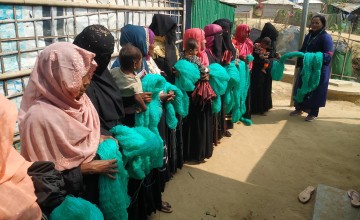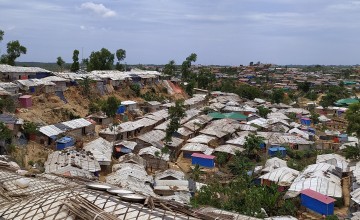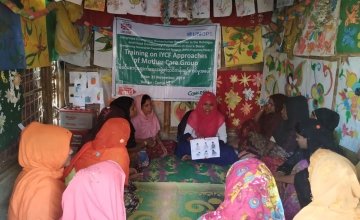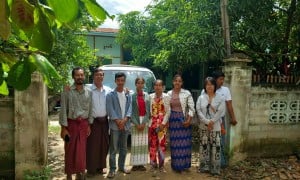
Read our 2024 annual report

Knowledge Hub
Evaluation of Concern's Rohingya Emergency Response 2017 - 2020 in Bangladesh
Since September 2017, Concern has scaled up its operation in Cox's Bazar, Bangladesh to address the humanitarian needs of the Rohingya people living in refugee camps there.
This evaluation has examined Concern's work in the emergency response from 2017 - 2020 and the report includes a number of conclusions on the programme and makes recommendations for potential further areas of focus.

Background
Concern Worldwide has been working in Bangladesh since 1972 and has worked in Cox’s Bazar intermittently over the years. Since September 2017, Concern has scaled up its operation in Cox’s Bazar to address the humanitarian needs of the Rohingya people living in refugee camps. As part of the initial response in 2017, Concern focused on responding to the emergency by providing emergency nutrition services to reduce both Severe Acute Malnutrition (SAM) and Moderate Acute Malnutrition (MAM) and Non Food Items (NFIs) to meet immediate needs. Over time the operation also worked on Disaster Risk Reduction (DRR) to reduce the seasonal weather and disaster vulnerability of at risk Rohingya people and the Bangladeshi host communities living in Cox’s Bazar.
Host communities, including poor Bangladeshi families living in the area around the refugee camps, have also struggled with this crisis – with rising costs of living and loss of land traditionally used for farming. To ensure that all communities were and continue to be supported, and to alleviate tensions between the two communities, Concern’s livelihood interventions have been expanded to include these populations.
Three years on, Concern continues to provide quality life-saving integrated nutrition services, and tailored outreach messaging with a focus on prevention of malnutrition. In 2020, Concern also began responding to the COVID-19 crisis working to improve the resilience of vulnerable households and improve COVID-19 infection prevention and control at health facilities and community level in the Rohingya refugee camps in Cox’s Bazar. Concern generally implement projects directly in Cox’s Bazar, and in partnership with INGOs on a number of projects.
Concern has received funding from UNICEF, WFP, IOM, UNOPS, DEC, KOICA and others. Concern was elected as Chair onto the Steering Committee of the Team Leaders Forum. The Cox’s Bazar Team Leader Forum (CB-TLF) exists primarily to act in the interest of the betterment of serving beneficiaries and provides a space for International NGOs to share views and to discuss strategic and operational issues.

Evaluation findings
The evaluation used the Organisation for Economic Co-operation and Development–Development Assistance Committee (OECD-DAC) Principles for evaluating humanitarian assistance to provide a structure to the findings. These criteria were Relevance/ Appropriateness, Connectedness, Coherence, Coverage, Efficiency, Effectiveness and timelines, and Impact. The cross cutting themes of Equality, Protection, Disaster Risk Reduction, Partnership and Environmental Impacts were also evaluated. Each criteria was scored on a scale from 0 - 4 as below:
- 4 - Outstanding performance
- 3 - Performance in line with what would be expected of a well-functioning organisation
- 2 - Generally acceptable performance but with some clear, and documented, shortcomings
- 1 - Barely acceptable performance with some major shortcomings and reservations
- 0 - Totally unacceptable performance or insufficient data to make an assesssment
During the evaluation exercise, the desk review and interviews with a number of Concern staff and other stakeholders highlighted some issues related to information management; digital data collection and data protection concerns, delays in procurement, in some cases late submission of donor reports but no major shortcomings and reservations were found. Overall performance were found to be satisfactory and in line with what would be expected in a normal Concern programme. The evaluation found that all of the extended DAC criteria and cross cutting themes evaluated scored a 3 on this scale, with the exception of Disaster Risk Reduction, which was scored at 2.

Relevance / Appropriateness
The evaluation found that Concern's Rohingya Refugees response interventions are in line with the needs of Rohingya refugees and vulnerable host communities in Cox’s Bazar and is aligned to Government of Bangladesh and Nutrition and food security sector priorities as outlined in the Joint Response plans 2020 for Rohingya Response. Concern's interventions contributed to the achievement of Strategic objectives of Joint Response Plan (JRP) 2019 and 2020 and directly contribute to Sector objectives for Food Security and livelihood and Nutrition sector.
Connectedness
The evaluation found that communication channels were quite heavy and over loaded in the early years of the response with some challenges encountered due to the disconnection between the head office in Dhaka and the field office in Cox's Bazar, but that the communication between the two offices had significantly improved in the last year or so. Difficulties in staff turnover and obtaining visas and approvals from the Bangladesh government were also cited as reasons impeding the deveolpment of a Joint Emergency Preparedness and Response Plan (JEPRP) with Alliance2015 partners.
Coherence
All Concern interventions in Cox’s Bazar are implemented in refugee camps and nearby host communities and all interventions are part of the Joint Response Plan for Rohingya response and are aligned to Core Humanitarian Standards, SPHERE standards and other humanitarian principles and country and context specific standards.
Coverage
All Rohingya refugees are considered vulnerable and were targeted for humanitarian assistance. Concern targeted all Rohingya refugees in selected camps with Nutrition curative and preventive and food security interventions and the most vulnerable groups in camps and host communities with livelihood and income generation interventions. The difficult geographical terrain combined with the heavy monsoon rains during the project period made it difficult for people with disabilities to access services and they were often among the least informed about available services. Concern’s approach was to identify beneficiaries through house-to-house visits in target camps which ensured women and girls with disabilities were equitably included in the beneficiary selection process. Project volunteers made house-to-house visits to identify potential beneficiaries in consultation with Majhis (Rohingya community leaders).
Efficiency
The evaluation found the Cox's Bazar response to be effieicent in terms of budget, with staff reporting they felt the activities were budgetd appropriately. Challenges in procurement and logistics were addressed in 2018 with the deployment of a Concern Surge Logistician and the response now has a fully functioning logistics team based in Cox's Bazar, through which the majority of procurement and logistics functions are performed.
Effectiveness and Timeliness
The evaluation noted initial challenges for Concern in immediately responding to the influx of Rohingya refugees in August 2017 due to restrictions on permissions to NGOs to respond and early funding limitations. It noted that the Concern Country Office were required to engage in a lot of advocacy in order to gain permission for Concern to intervene with the small funding amount while they were securing larger amounts of funding to maintain the response. By December 2017, Concern had secured €1.95 million for the Rohingya response. The evaluation noted that organisations who had significant amounts of internal funds at their disposal to respond rapdily to the emergency were able to have a broader presence and attract more funds from institutional donors later in the response. Concern can learn lessons from this to be able to respond more rapidly to future emergencies. Information collected from individual interviews and key informant interviews from target communities revealed that generally, the target refugees and host communities were satisfied with Concern interventions to date and felt that their needs were met on time.
Impact
The evaluation found that Concern's programme in Cox's Bazar is making a significant positive contribution to improve the social, economic, health and nutrition situation of Rohingya refugess and host communities, particularly for children, pregnant and lactating women, adolescent girls, the elderly and people with diabilities. The integrated approach in nutrition programme, livelihood and income generation interventions has had a significant impact on the prevention of malnutrition by improving dietary diversity and providing additional sources of food beyond WFP rations distributions.
Conclusion
The Rohingya response is a complex emergency and a challenging environment in which to operate and successfully implement programmes. The evaluation noted that overall, the Concern Rohingya response programme was found to be highly relevant and fit for purpose. It addresses the wide range of issues that affect the overall health and nutrition of extremely vulnerable populations in Refugee camps and host communities in Cox’s Bazar. Concern's response in Cox’s Bazar is well adapted to the local contexts, priorities and needs.
This publication covers aid activities implemented with the financial assistance of several donors, including UNICEF, WFP, IOM, UNOPS, DEC, KOICA, among others. The ideas, opinions and comments herein are entirely the responsibility of the author(s) and do not necessarily represent or reflect the policies of any donors.




